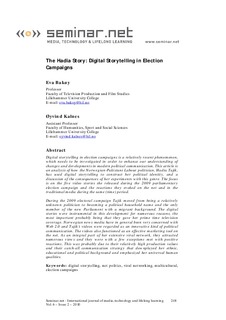The Hadia story: digital storytelling in election campaigns
Journal article, Peer reviewed
Permanent lenke
http://hdl.handle.net/11250/145198Utgivelsesdato
2010Metadata
Vis full innførselSamlinger
Sammendrag
Digital storytelling in election campaigns is a relatively recent phenomenon, which needs to be investigated in order to enhance our understanding of changes and developments in modern political communication. This article is
an analysis of how the Norwegian-Pakistani Labour politician, Hadia Tajik, has used digital storytelling to construct her political identity, and a discussion of the consequences of her experiments with this genre. The focus is on the five video stories she released during the 2009 parliamentary election campaign and the reactions they evoked on the net and in the
traditional media during the same (time) period.
During the 2009 electoral campaign Tajik moved from being a relatively unknown politician to becoming a political household name and the only member of the new Parliament with a migrant background. The digital stories were instrumental in this development for numerous reasons, the most important probably being that they gave her prime time television coverage. Norwegian news media have in general been very concerned with Web 2.0 and Tajik’s videos were regarded as an innovative kind of political
communication. The videos also functioned as an effective marketing tool on the net. As an integral part of her extensive viral network, they attracted numerous views and they were with a few exceptions met with positive reactions. This was probably due to their relatively high production values and their catch-all communication strategy that downplayed her ethnic, educational and political background and emphasized her universal human qualities.
